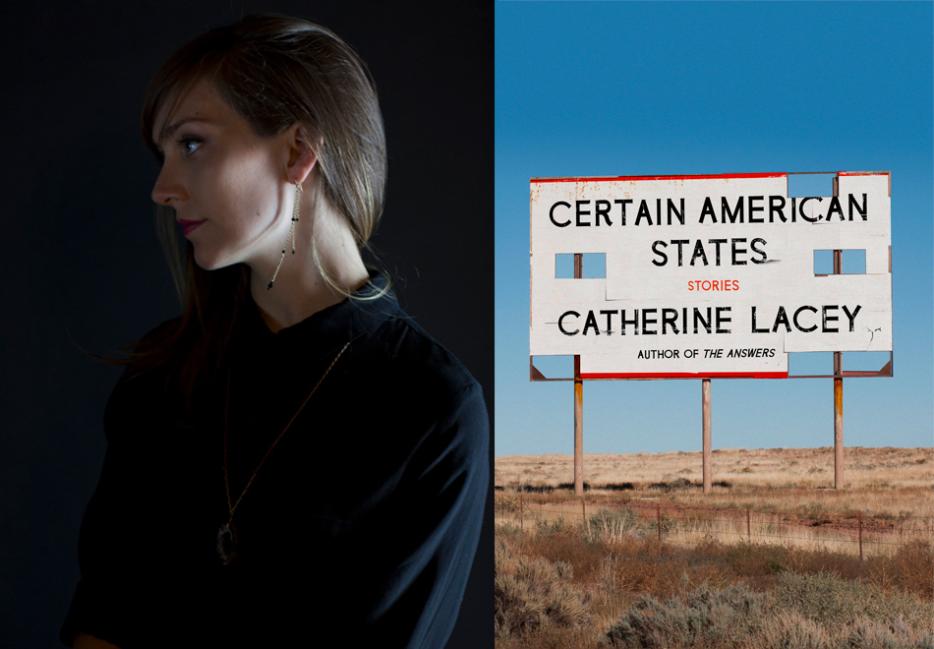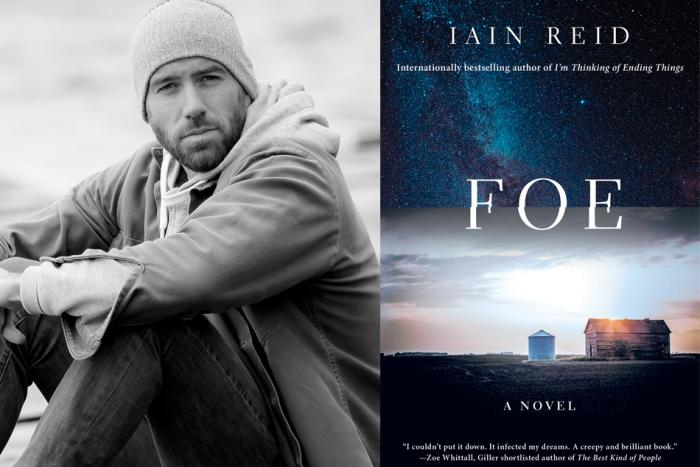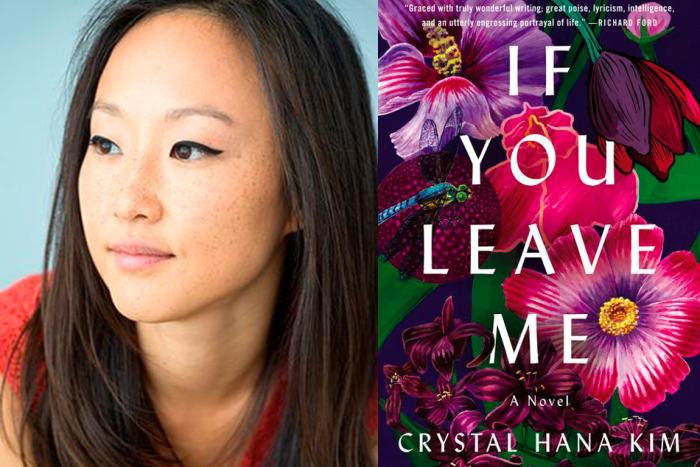In Catherine Lacey’s short story collection Certain American States (Farrar, Straus & Giroux), characters with rich interior lives are captured in acute moments of existential ennui. They navigate surreptitious affairs and dissolving marriages, run away from their families and hometowns, and generally resist modes of social containment by bravely, brazenly, treading their own paths. Whether “dizzy with failure” or slightly unmoored, Lacey’s characters chart a wide range of emotions—which are often, compellingly, at odds with their external landscapes. In a story cut into twenty-four discrete sections—perhaps an effort to organize wild, expansive prose—the narrator divulges, “There’s a word for the scrambling of senses, but there’s no way to explain how I’m always reeling from unclear feelings and memories, no word that’s not an insult, anyway, or a diagnosis.”
As demonstrated in her first two novels, The Answers and Nobody is Ever Missing, Lacey is skilled at creating worlds where intimacy and loneliness and alienation and abundance can coexist. We talked about un-sentimentalizing the process of writing, the Freudian concept of the “narcissism of small differences,” and intimate relationships as a potent narrative space.
Anna Furman: I read Certain American States while also reading Rebecca Solnit’s A Field Guide to Getting Lost and found the two books to be—for lack of a better word—quite complementary. In both books, characters reconcile complicated interior landscapes with external situations/conditions/predicaments. I wonder which books about place or placelessness or lostness informed your writing?
Catherine Lacey: A Field Guide to Getting Lost is definitely in there, but I actually didn’t read it till 2016. I think of Grace Paley a lot. I don't love everything she’s written, but I’ve always been drawn to the way a character can kind of just wander around a space in a Grace Paley story.
And Lydia Davis too. I don't think I’m anything like Lydia Davis, but I really love Lydia Davis. I was thinking about writing a book of stories that are derivative of Lydia Davis. Sometimes I find myself complaining about something or launching some complaint at my partner and then I realize after, it’s a Lydia Davis story. I think it speaks to how embedded some of her characters are in my head. They become crucibles for me to express something that I might feel.
I’m not so much influenced by autobiographical things but more by situation, like odd predicaments that one could get into. When I took care of my dog by myself for the first time, it was a very productive time. I wrote a lot out of it. It was only three days, but there was something about the fact of being alone, just me and this dog for three days, and not knowing anyone else in town, that changed me.
I just read Motherhood and listened to a couple interviews with Sheila Heti. And I can’t stop thinking about an interview on the Longform podcast with the writer Elif Batuman. I was totally lit up by that interview. It really tore me a new one, in a good way.
As I read this collection, my understanding of the title changed, from referring to certain, specific states in the U.S. to states of being. Did you have other working titles for the book? When did you arrive at Certain American States?
In 2014, when I started thinking I had enough stories to finish up a collection, I called it “Small Differences.” I thought it was most exemplary of a new way I was working. It comes from this Freudian concept of the narcissism of small difference. But many of the stories changed and finally “Small Differences” didn't feel sufficient anymore.
I had to make a decision on the cover right after the election. “Certain American States” is the oldest story in the collection. It felt like the right title because it has a four-pronged meaning and made me a little bit uncomfortable. I tend to move towards things that feel like too much to say or too embarrassing to say. Then I want to say it.
I felt mixed about the title till recently, because I think the word America is pretty ugly. Just as a sound, I don’t particularly like it. And I find the majority of things it connotes to be pretty ugly. Eventually, you just resign yourself to the limits of a title. And at different points in the process of choosing one, you can feel completely convinced that one is great, and then two days later feel like it’s the worst title in the world. Maybe both of those things are true. And all titles are ultimately insufficient. That’s why the whole story is there.
In “ur heck box” the narrator describes Midtown Manhattan as a place that looks exactly the way her head feels: “bleak and crowded.” What places look the way your head feels right now?
I’m sitting in a public space right now, on a patio area attached to the apartment that I just moved into. It’s just a big slab of Astroturf. I feel like it’s some kind of a fake comfort in the midst of an urban landscape.
There are parts of the country where you get four seasons in a day. I feel like, internally, I experience five seasons in a day. Or maybe ten seasons. I wrote “ur heck box” during a period of grief—and what’s striking to me about grief is how much pain you can feel for so long. You become LA weather, but not happy. It’s where nothing changes.
In the story “Family Physics,” you write: “Since the World Trade Center, people had stopped whispering about the apocalypse and began to speak of it, plainly and loudly, whenever.” Did you write this story during the post-9/11 Bush years? Since Trump was elected and we’ve all been catapulted into this new political reality that feels apocalyptic to many of us. Did you tweak these stories to reflect that change?
When Bush was elected, I was sixteen or seventeen. There was this feeling of defeat and darkness among my few liberal friends in Tennessee. I wrote “Family Physics” during the 2016 election, while I was working at a college in Montana. This felt like a crazy, exaggerated version of the 2000 election. When you’re a kid in high school versus an adult employed at a university, your perspective of what these things mean is completely different.
I’ve been thinking about the kind of rage we feel across political boundaries, and yet how neutered that rage is. Nobody really does anything. There’s no real upheaval or shift of power. We just get this teeter totter of eight years of this, eight years of this, eight years of this.
It made me think of the country as one big, horrible family going through these periods of time together, with different people feeling more or less like black sheep within that family. There’s different times when more marginal or outside perspectives might feel like they have a place within this country. And sometimes, brutally outcast. I wasn’t consciously sitting down and thinking: I know, it’ll be a family that is microcosmal of the country. It’s only on reflection that I can see that.
How do you know when a story is finished?
You know how, when you taste a sauce, you know: oh, it needs more of this or less of that? It’s done or it’s not done. It’s kind of like that. And the more sauces you make, the more you know what sort of texture and flavor profile you’re looking for, and how much salinity.
It’s like a fingerprint that you don’t realize you’re developing. And you know when all the pieces are there, but you don’t necessarily know how to describe putting all the pieces together. You know how an old grandma might make the best tomato sauce, but when they try and explain the recipe to you, yours doesn’t come out like theirs? I think it’s a bit like that.
In the first story, “Violations,” the characters don’t have names but are identified by their pronouns. Why did you decide to write them as she and he instead of as people with specific names?
There’s this way that a relationship between a man and a woman, or between anybody and anybody, can be claustrophobic. Whether it’s she or he or me or you, it’s always you and the other. You feel like you have an entire world with this other person.
A relationship is an interesting narrative space because it’s not always clear who is in control and who is really writing the narrative.
It wasn’t important to me whether the characters had names. It’s hard for me to remember which things the man says and which things the woman says or even what the roles are because they’re switching back and forth so quickly. Their names become irrelevant. Characters are not actual human beings of course, so really it’s a matrix of ideas and feelings and postures and situations. Sometimes it makes sense for that matrix of thought to be held by a female person or a male person. Maybe part of it is that when you’re a younger writer, sometimes it’s better just to limit the variables that you’re having to juggle at one time. It’s easier to make the character have the same sort of biochemical reality and social experience that you have.
I had a big break-up two years ago and the anger that you can feel over how the other person will necessarily have a different narrative about what happened during the break-up and why you broke up and why you got together and what happened all those years is so potent and so visceral. Once you’ve experienced that rage, you recognize it.
There’s a line in “Violations” that goes: “He had wanted to make sure she wouldn’t write about him, but he knew he couldn’t ask her outright not to write about him, since he was sure such a question would set off a lecture about how he was not within his rights to…” Have friends or family members misinterpreted characters that you’ve written as representing them?
There’s this interaction between any writer’s life and what they’re writing about. In the past, I’ve felt extremely nervous about what this or that person thinks of this or that character, if something shows up in my fiction that looks a lot like my life or that person. I’ve been worried about hurting someone’s feelings—or, in writing a story, sometimes I realize that I don’t care anymore.
I have an ex-husband and he’s actually a really marvelous person in a lot of ways. I didn’t want him to come across the story without knowing that it was coming. I decided to send it to him ahead of time, and actually, he totally got it and wasn't angry. It made me realize that there’s a lot of wasted energy in being worried about what people are going to think about you because of your fiction. Or what they’re gonna think about what you might think of them, because of what you write in fiction.
I didn’t write the story out of malice. I wasn't angry at him, directly, and I wasn't painting anybody out to be the wrong person. I think that if you’re in that place, writing about situations that relate very closely to your life narrative can be a fine thing to do. Also because you can write into spaces that you didn’t get to experience. There’s a lot of things in that story that certainly didn’t happen and the details are not representative of an autobiography. Sometimes you want to exaggerate certain things and tone down other things and see if you change the proportion of story that you experienced. By amplifying one aspect of it and turning down another, what does it look like then? You shuffle the characters around or try and imagine something from someone else’s perspective. I think it can be useful to understand that your perspective on your life is maybe not the most important aspect of it.
Some friends of mine that recently got married said, “Ah yes, the final test of getting married, combining your books on the same bookshelf.” And I was like: “the final test of getting married is getting divorced and seeing if that’s a good person to get divorced from.”
I wanted to ask you about silence as a device. You write that silence “could choke a person” and about characters that “exchanged the kind of nonspeech that people with nothing to say to each other end up saying to each other.” What does silence in these varying forms mean to you?
The way I teach my writing workshops, usually, is a bit different from the traditional workshop method. In my workshop, the student that’s being workshopped has to sit in front of the class and take these questions from the rest of the students. I always encourage the person to sit there as long as they want before answering a question, to decide how they feel about it and let the answer come to them under the awkwardness and duress of a room of people waiting on something from you. It can be a bit of a pressure cooker when you’re silent with someone else.
And then there’s the silence of just being a human being and having to walk around the world and spend all your time with yourself. I love multitasking and listening to music and absorbing a podcast and doing ten things at once. But when I remember to leave things at home and just walk my dog without my phone, aimlessly, I find myself writing stories in my head, and it’s so useful. Silence is an endangered species. It’s a very rich, sort of fecund area of human existence that’s not really taken advantage of enough.
I read a conversation you had with Leslie Jamison in which you said: “There is really no way to demystify the creation process, though I do think it’s a good idea to un-sentimentalize it.” I think it’s a challenge for interviewers to ask craft-oriented questions that don’t romanticize the writing process. So, maybe, what are the most unglamorous or mechanical parts of your writing process?
I wake up most mornings, five to six days a week, and go away. Don’t say anything. I find it’s really helpful not to speak to my partner or my dog or anybody. And just go, drink some coffee and write.
Last year, I was living in Mississippi teaching at the university there for a one-year residency. I’ve been pretty transient the past couple years, living in different places every few months, so I’ve had to be more adaptable.
I need to work in public, because every time I work at home, I do the laundry instead of working. Or clean something or procrastibake—bake something really elaborate, and then, it’s like 10 a.m., and I’m like, “what the fuck am I doing?” For several years, I had my place, a cafe in Brooklyn, and they just knew me. I felt really comfortable there. I knew where to sit, and what time to arrive so that it wasn’t crowded yet. I really believed that if I left that pattern, I just wasn’t going to write anything else. Now I’ve found that I can write at home. I can write in the afternoon. I can write other times of day. I just prefer working in the morning on a clean brain—before I’ve checked my email or worried about anything that probably needs some worrying. I think it doesn't matter that much, as long as it’s the morning and there’s coffee.






